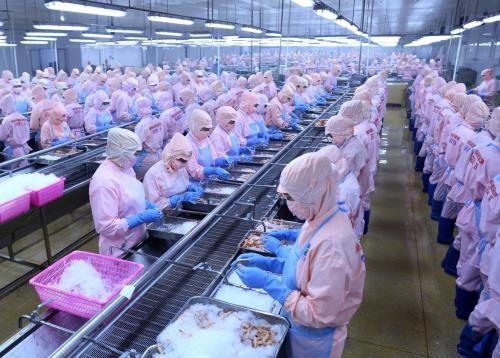The Government should have policies to support research and processing that would used shrimp by-products as high-value products, experts have said.

The Government should have policies to support research and processing that would use shrimp by-products as high-value products, experts have said.
For every kilo of shrimp, processing plants leave out 35-50 per cent of by-products, including heads and shells.
Shrimp output was more than 720,000 tonnes last year, and the processing industry produced 320,000 tonnes of by-products from them, they said.
This is a waste, researchers said, adding that by-products contain many nutrients that can be used in pharmaceutical, cosmetic and animal feed production.
Many new products with a high-profit margin could enter the market if there was a comprehensive research investment strategy, they said.
Phan Thanh Loc, deputy chairman of Viet Nam Food Company, said many developed countries had successfully developed products from fishery by-products.
The application of technology increases the value of shrimp by-products by many times.
One kilo of shrimp heads sold to animal feed producers and businesses just earn a few thousand dong. However, if technology is used to extract nutrients from shrimp heads for use in the food industry and animal feed, businesses could earn over VND20,000 on every kilo of shrimp heads, he said.
In particular, if businesses extract chitosan, which is used in making food wrapping film, they could earn much more money, he added.
Dr. Trang Sy Trung, rector of Nha Trang University, said that shrimp heads and shells were still considered waste and used mostly to make food for animals instead of for other purposes.
Studies have shown that the nutrient content in shrimp by-products is high: 8 per cent lipid, 20 per cent chitin and 48 per cent protein.
Scientists from Nha Trang University have conducted research to develop useful products from shrimp by-products for the agricultural, aquaculture and pharmaceutical sectors, including chitosan solutions for treating fungi on mango and chili.
According to the Ministry of Agriculture and Rural Development, research institutes, universities and companies have researched and invested in products made from shrimp by-products but the results have been modest, with the output being mostly raw products.
Businesses and scientists said there were few specific policies for supporting the processing of shrimp by-products and marketing of products made from the by-products.
They suggested that the Government provide support to increase the use of these by-products by more enterprises and researchers.
Recently, the Ministry of Science and Technology coordinated with Nha Trang University and Viet Nam Food to launch a fund for supporting the development of the shrimp by-product sector in Viet Nam.
The fund’s main purpose is to support research and the training of human resources, with the aim of developing high-value products from shrimp by-products. — VNS





